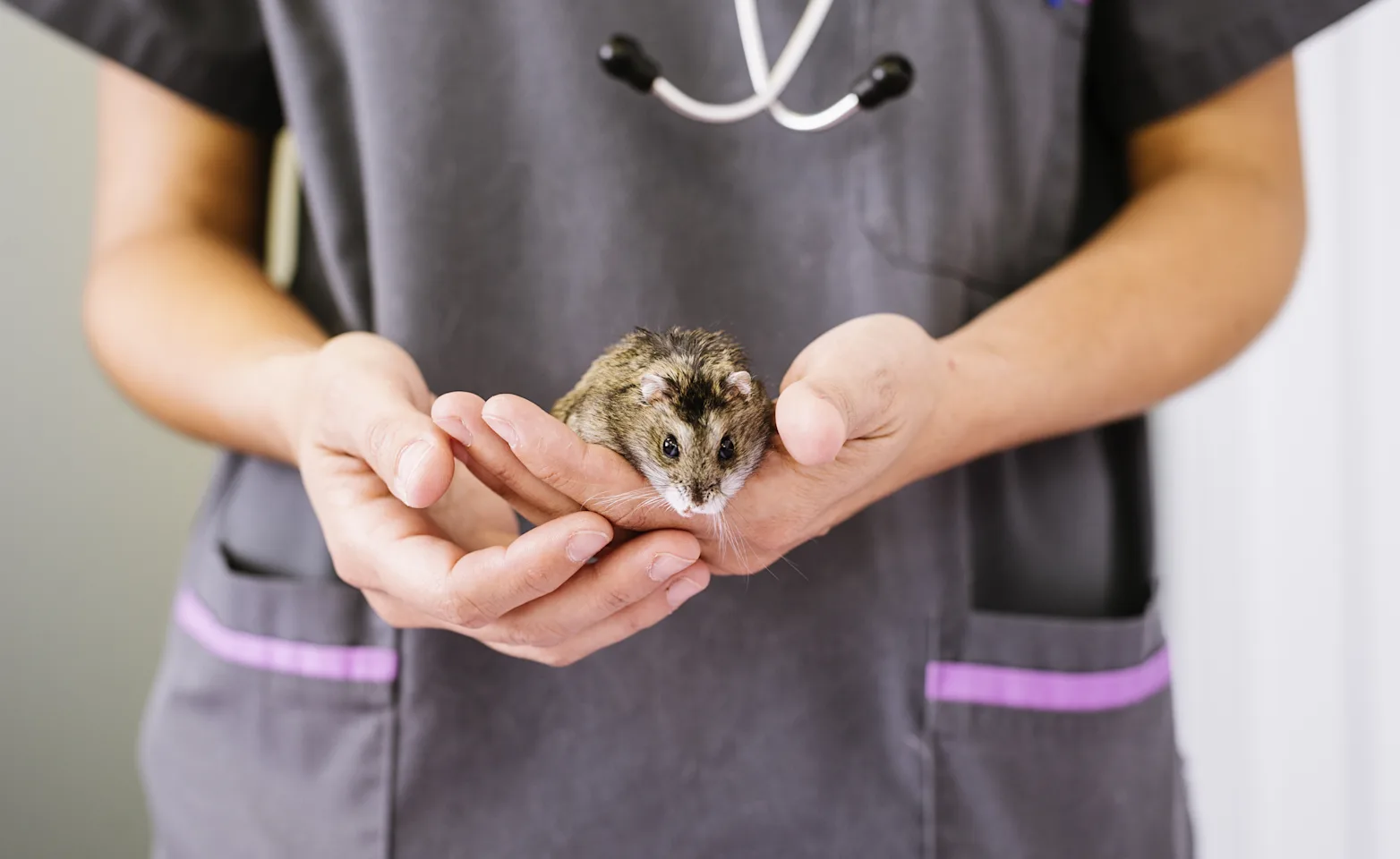Warren Woods Veterinary Hospital

Gerbils are small social rodents with furry tails are native to Mongolia. They reach about 8 inches in length including their tails. They come in a wide variety of colors commonly: agouti (brown), black, or tan. Gerbils reach an average age of 3-5 years in captivity.
Gerbils have a variety of unique behaviors some of which include thumping, grooming, fighting and digging. Thumping is done as a danger warning for the colony or as a mating call. This is performed by the gerbil rhythmically thumping their hind feet. You will notice that the other gerbils perk their ears and listen; a warning thump is followed by warning thumps from the others in the colony while a mating thump is often ignored. You may notice a small hairless patch on your gerbil’s stomach; this is a scent gland and is used to mark territory and family members. Grooming is performed to keep clean and is a very important part of the gerbils’ interaction with one another within a colony. Play fighting or roughhousing is a normal behavior. This consists of them jumping and pouncing on one another and boxing by standing on their hind legs and hitting each other like kangaroos. Digging in the bedding and at the sides and corners of the cage is normal. Your gerbil is following its natural burrowing instincts.
Always wake your gerbil before picking it up so it’s not startled. Gerbils should never be picked up by their tail; as a natural defense mechanism, your gerbil can slip out of the fur on its tail. You will be left holding a handful of fur as your gerbil jumps away. This can be very painful and damaging to the skin and soft tissue of the tail. Instead, gently scoop your gerbil from its underside using two hands.
Gerbils are highly social creatures that live naturally in colonies. It is important to house gerbils same sex groups of at least two gerbils and introduce them at a young age. Gerbils are very curious and playful and require a large cage with toys to keep them entertained. Toys may include cardboard, wood and hard plastic toys found at your local pet store. Make sure to remove any toys that your gerbil is chewing pieces from as these may be ingested and make your gerbil sick. An exercise wheel with a solid bottom is a great toy for your energetic gerbil.
A 15 gallon aquarium with a tightly fitting screen lid is adequate for a pair of gerbils; larger enclosures are required for larger groups. Wired cages with levels and ramps are a lot of fun for your gerbils but they must be monitored to ensure they are not chewing on the wire. Bedding should consist of recycled paper products. Litters made of wood shaving may be irritating to the gerbil’s mucus membranes, skin and respiratory tract. Wood shavings may also be contaminated with pesticides or parasites. Gerbils love to tunnel and redecorate their enclosures so be sure to use a thick layer of bedding at least 2-3 inches deep and provide tunneling toys such as PCV pipe and cardboard paper towel rolls or toilet paper rolls. A hide house is important for your gerbils to have a place in which to hide and sleep. Houses can be purchased at your local pet store or can be made out of a cardboard box. The enclosure should also be escape proof since these little critters are very intelligent. The cage should be cleaned as needed usually once weekly, with a mild soap.
Food should consist of a commercial gerbil diet purchased at your local pet store. This is commonly made up of pellets and seeds and should have a protein level of 12% and fat content of 6-7%. A rodent block or lab block should also be offered, this fortified block provides the nutrients your gerbil needs. You may offer fresh fruits and vegetables and hay such as timothy hay or orchard grass. Avoid cabbage, potatoes, onions, uncooked beans, chocolate, caffeine, candy or junk food as these can be harmful to your gerbil. Treats purchased from your local pet store can be offered in moderation. Avoid sudden or drastic changes to the diet as this may lead to diarrhea.
Fresh water should also be available at all times, a water bottle or ceramic dish may be used. Young gerbils should have both a dish and bottle available to ensure they stay hydrated as most youngsters may not understand the water bottle as a water source.
Gerbils enjoy a dust bath a few times a week to help keep clean. This pumice or fine ground volcanic rock dust can be purchased at your local pet store along with a dust bath house. Your gerbil will jump and roll around in the dust which absorbs dirt and oil.
Your gerbil should be examined yearly by a qualified exotic veterinarian to ensure it lives a long and healthy life. If your gerbil shows any signs of illness such as sneezing, lethargy, decreased appetite or diarrhea it should be seen immediately. Some common health concerns are respiratory infections, tumors, strokes, seizures, mites, diarrhea and malocclusion.
